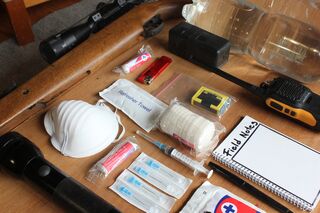Environment
Were the Doomsday Preppers Right?
Post-apocalyptic and doomsday prepping beliefs were put to the test in 2020.
Posted April 6, 2021 Reviewed by Abigail Fagan
Key points
- Prepping beliefs encompass a pessimistic worldview that doom is imminent, people are uncooperative, and resources are limited.
- The crises in 2020 have demonstrated that cynicism about human nature is largely unwarranted, while concerns about resource availability are more legitimate.
- People with prepping interests tended to be better prepared for the pandemic, research suggests.

Spoiler alert: The short answer is “sort of.”
Doomsday preppers are those who believe that a doomsday scenario or societal collapse is imminent and, therefore, spend a good portion of their time preparing for survival. For example, they might stockpile supplies and munitions, devising plans and infrastructure to defend themselves from others.
Before I discuss how the preppers were right and wrong, a little background on how I came to investigate this odd question. I am a professor of personality and social psychology at the University of Houston. My research has always focused on how people think about and understand their social world. The best part of this focus is that I can often look at people’s behavior and beliefs in the real world (or on TV) for inspiration for my research.
When I was a graduate student at North Dakota State University, the National Geographic reality series “Doomsday Preppers” aired, as did the AMC show “The Walking Dead.” When I watched these shows, I was intrigued by the perceptions about what a post-apocalyptic world would be like and how people would behave, and the level of doomsday prepping some people engage in.
If I am being honest, I thought that most of these beliefs and behaviors were irrational. Indeed, research shows that people are intuitively cooperative, so why the cynicism? Furthermore, aside from the looming dangers of climate change, the idea that some biblical catastrophic event affecting our access to resources seemed far-fetched. Therefore, I wanted to learn more about these post-apocalyptic and doomsday prepping beliefs.
After I finished my Ph.D., I moved to Germany for a postdoctoral position. There, I had the resources and freedom to conduct research on topics of my choosing and one of them was post-apocalyptic and doomsday prepping beliefs. A few colleagues and I decided to create a questionnaire of these beliefs and published our work in the European Journal of Personality.
What we found was that these beliefs are made up of an overall component and three subcomponents. The overall component is a general pessimistic view of a post-apocalyptic world – mostly that the doomsday is imminent, the resources will be limited, and that humans will be uncooperative. The three subcomponents are 1) negative beliefs about human nature and the availability of resources, 2) beliefs about competition for survival, and 3) beliefs in the need to be prepared.
Each of these beliefs reflect a variety of personality traits (e.g., low agreeableness and high neuroticism) and beliefs (e.g., political ideology and conspiracy beliefs). We also found that major political events led to increases in people’s beliefs that they needed to engage in prepping behaviors. However, the general point is that those scoring high on these beliefs have a rather cynical view of human nature, the availability of resources, and our ability, as a society, to handle catastrophes.
The Lessons Learned from 2020
When we started the post-apocalyptic and doomsday prepping beliefs project, we thought that holding these hypothetical beliefs might be important for understanding some general everyday behaviors. We did not think that they would be applicable to actual events. Then came 2020. Since we published our work in 2019 we have seen a global pandemic, mass protests for racial justice, a record-setting hurricane season, the storming of the US capitol, and a record-setting freeze in Texas that left millions without electricity or water for days, to name a few. The point is, we have had a number of opportunities to see whether cynical post-apocalyptic and doomsday prepping beliefs are warranted.
As for concerns about human nature, it does not appear that high levels of cynicism are warranted. While there were some cases of questionable human behavior, people were fairly cooperative in most events. For example, during the Texas freeze, many of the people who did not lose their electricity invited those who did into their homes, even as the threat of the pandemic raged on.
Concerns over the availability of resources is another story. At the beginning of the pandemic, many stores ran out of essential supplies. Further, during the Texas freeze, supply chains broke down such that many grocery store shelves were empty by the end of the week. Therefore, while concerns about human nature are probably overly cynical, concerns about the availability of resources in post-apocalyptic scenarios may be warranted.
What about believing in the need to prep? While prepping needs may not be to the level of building bunkers, having elaborate bug-out plans, or stockpiling assault rifles, it does seem fairly legitimate to have enough food and supplies to last at least two weeks. This reality has particularly dawned on me living in the hurricane vulnerable city of Houston, Texas. For example, when we were threatened with a particularly strong storm in 2020, I realized just how unprepared we were in terms of food and supplies.
Furthermore, related to the pandemic, researchers in the US and Denmark have even found that fans of horror movies were less stressed by the pandemic and fans of prepper films were better prepared for the pandemic. They suggest that fans of these film genres get mental practice for such global catastrophes. Therefore, it seems that some level of prepping is warranted.
Overall, my thoughts on post-apocalyptic and doomsday prepping beliefs changed from hypothetical curiosity to reality. While taking any belief to the extreme is a bad idea and people do not need to be as cynical and conspiratorial about human nature, it is probably a good idea to be prepared to some extent. Having non-perishable food and supplies assuming that you might be without power or access to grocery stores for two weeks seems reasonable.
This is especially true when considering the future of climate change. In this case, we will likely see more and stronger natural disasters. Further, some aspects of climate change might impact food supplies as the climate becomes more erratic.
For those interested in how to be prepared for emergency situations, the CDC has resources in relation to a variety of emergency scenarios.
References
Fetterman, A. K., Rutjens, B. J., Wilkowski, B. M., & Landkammer, F. (2019). On post-apocalyptic and doomsday prepping beliefs: A new measure, its correlates, and the motivation to prep. European Journal of Personality, 33, 506-525.://doi.org/10.1002/per.2216.
Rand, D. G., Greene, J. D., & Nowak, M. A. (2012). Spontaneous giving and calculated greed. Nature, 489(7416), 427-430. https://doi.org/10.1038/nature11467
Scrivner, C., Johnson, J. A., Kjeldgaard-Christiansen, J., & Clasen, M. (2021). Pandemic practice: Horror fans and morbidly curious individuals are more psychologically resilient during the COVID-19 pandemic. Personality and Individual Differences, 168, 110397. https://doi.org/10.1016/j.paid.2020.110397




